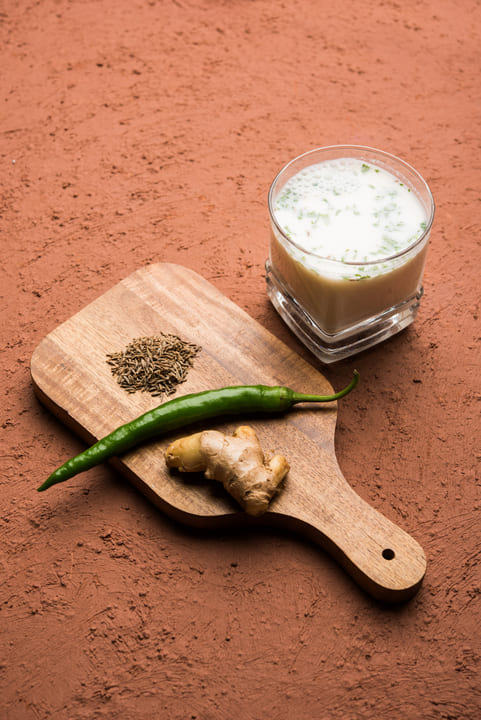Ancient wisdom and modern science agree on the numerous health benefits of buttermilk. The Sanskrit saying “Takram Shakrasya Durlabham” highlights its importance, suggesting even Lord Indra couldn’t quickly obtain it.
Buttermilk in Ayurveda and Modern Medicine
Ayurveda extensively describes buttermilk’s benefits and uses it in various medicines. Modern research confirms its positive effects on cholesterol, blood vessel health, immunity, and ageing. The lactic acid in buttermilk prevents blood platelet aggregation and free radical accumulation.
Scientific Facts
1. Probiotic Powerhouse
Buttermilk contains beneficial bacteria like Lactobacillus acidophilus, which support gut health and boost the immune system.
2. Nutrient-Dense
It’s an excellent source of vitamins B12, B2, and D and minerals like calcium, potassium, and phosphorus.
3. Low in Calories
With only about 99 calories per cup, buttermilk is a nutrient-rich, low-calorie option for weight management.
4. Bioactive Peptides
Research has shown that buttermilk contains bioactive peptides that may have anti-inflammatory and antihypertensive properties.
5. Improved Nutrient Absorption
The lactic acid in buttermilk can enhance the absorption of minerals like calcium and iron.
Preparation and Consumption
Ayurvedic texts recommend a specific method for preparing buttermilk. It’s best consumed when made from sweet curd within 4-5 hours of milk curdling. Sour or improperly prepared buttermilk may cause health issues like colds, coughs, and hyperacidity.
Buttermilk and Doshas
Sweet buttermilk increases Kapha and neutralizes Pitta, while sour buttermilk reduces Vata but increases Pitta. Additives like rock salt, sugar, or Trikatu churna can balance doshas.
Medicinal Uses
1. Skin diseases
Use as a body cleanser for conditions like scabies and psoriasis.
2. Obesity
A buttermilk diet can aid weight loss without side effects.
3. Anemia
Promotes RBC production and enhances the effectiveness of Ayurvedic treatments.
4. Digestive issues
Helps with dysentery and related problems.
5. Tastelessness
A special buttermilk preparation can stimulate taste buds.
Scientific Research Findings
- Improves bone density and strength
- Protects against H. pylori infections
- Enhances memory and cognitive function under stress
- May reduce cancer incidence
- Beneficial for liver disorders, particularly hepatitis
- Increases HDL cholesterol and reduces triglycerides
- Lowers systolic blood pressure
Nutritional Benefits
Buttermilk is easily digestible, rich in calcium and Vitamin B, and contains beneficial bacteria that aid digestion. It’s an ideal food for weight management and overall health.
As the world increasingly recognizes buttermilk’s benefits, consuming properly prepared buttermilk is crucial to reap its full health advantages. Ongoing research continues to uncover new potential benefits of this ancient elixir, making it a valuable addition to a balanced diet.

